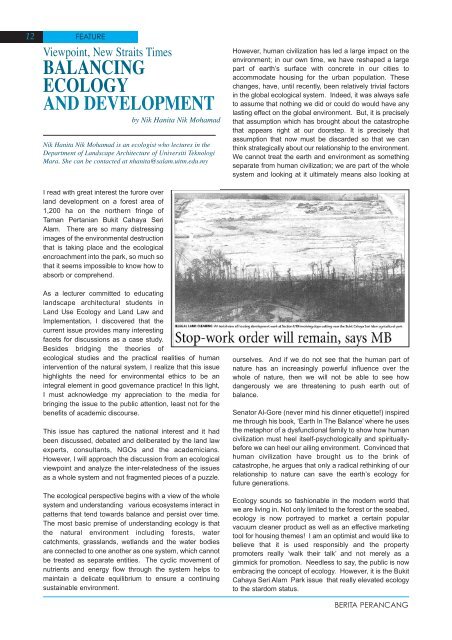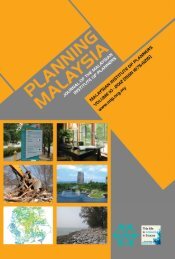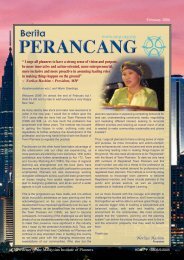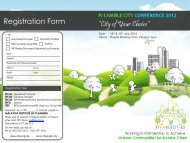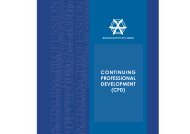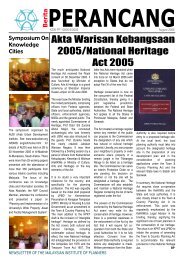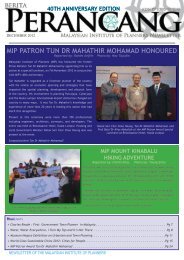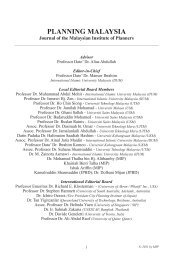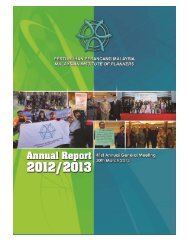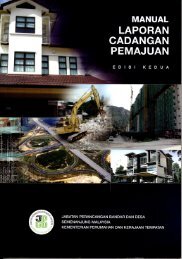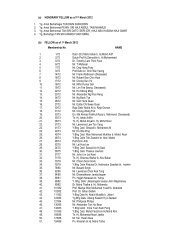Download November 2005 Issue - Malaysian Institute of Planners
Download November 2005 Issue - Malaysian Institute of Planners
Download November 2005 Issue - Malaysian Institute of Planners
Create successful ePaper yourself
Turn your PDF publications into a flip-book with our unique Google optimized e-Paper software.
12FEATUREViewpoint, New Straits TimesBALANCINGECOLOGYAND DEVELOPMENTby Nik Hanita Nik MohamadNik Hanita Nik Mohamad is an ecologist who lectures in theDepartment <strong>of</strong> Landscape Architecture <strong>of</strong> Universiti TeknologiMara. She can be contacted at nhanita@salam.uitm.edu.myHowever, human civilization has led a large impact on theenvironment; in our own time, we have reshaped a largepart <strong>of</strong> earth’s surface with concrete in our cities toaccommodate housing for the urban population. Thesechanges, have, until recently, been relatively trivial factorsin the global ecological system. Indeed, it was always safeto assume that nothing we did or could do would have anylasting effect on the global environment. But, it is preciselythat assumption which has brought about the catastrophethat appears right at our doorstep. It is precisely thatassumption that now must be discarded so that we canthink strategically about our relationship to the environment.We cannot treat the earth and environment as somethingseparate from human civilization; we are part <strong>of</strong> the wholesystem and looking at it ultimately means also looking atI read with great interest the furore overland development on a forest area <strong>of</strong>1,200 ha on the northern fringe <strong>of</strong>Taman Pertanian Bukit Cahaya SeriAlam. There are so many distressingimages <strong>of</strong> the environmental destructionthat is taking place and the ecologicalencroachment into the park, so much sothat it seems impossible to know how toabsorb or comprehend.As a lecturer committed to educatinglandscape architectural students inLand Use Ecology and Land Law andImplementation, I discovered that thecurrent issue provides many interestingfacets for discussions as a case study.Besides bridging the theories <strong>of</strong>ecological studies and the practical realities <strong>of</strong> humanintervention <strong>of</strong> the natural system, I realize that this issuehighlights the need for environmental ethics to be anintegral element in good governance practice! In this light,I must acknowledge my appreciation to the media forbringing the issue to the public attention, least not for thebenefits <strong>of</strong> academic discourse.This issue has captured the national interest and it hadbeen discussed, debated and deliberated by the land lawexperts, consultants, NGOs and the academicians.However, I will approach the discussion from an ecologicalviewpoint and analyze the inter-relatedness <strong>of</strong> the issuesas a whole system and not fragmented pieces <strong>of</strong> a puzzle.The ecological perspective begins with a view <strong>of</strong> the wholesystem and understanding various ecosystems interact inpatterns that tend towards balance and persist over time.The most basic premise <strong>of</strong> understanding ecology is thatthe natural environment including forests, watercatchments, grasslands, wetlands and the water bodiesare connected to one another as one system, which cannotbe treated as separate entities. The cyclic movement <strong>of</strong>nutrients and energy flow through the system helps tomaintain a delicate equilibrium to ensure a continuingsustainable environment.ourselves. And if we do not see that the human part <strong>of</strong>nature has an increasingly powerful influence over thewhole <strong>of</strong> nature, then we will not be able to see howdangerously we are threatening to push earth out <strong>of</strong>balance.Senator Al-Gore (never mind his dinner etiquette!) inspiredme through his book, ‘Earth In The Balance’ where he usesthe metaphor <strong>of</strong> a dysfunctional family to show how humancivilization must heel itself-psychologically and spirituallybeforewe can heel our ailing environment. Convinced thathuman civilization have brought us to the brink <strong>of</strong>catastrophe, he argues that only a radical rethinking <strong>of</strong> ourrelationship to nature can save the earth’s ecology forfuture generations.Ecology sounds so fashionable in the modern world thatwe are living in. Not only limited to the forest or the seabed,ecology is now portrayed to market a certain popularvacuum cleaner product as well as an effective marketingtool for housing themes! I am an optimist and would like tobelieve that it is used responsibly and the propertypromoters really ‘walk their talk’ and not merely as agimmick for promotion. Needless to say, the public is nowembracing the concept <strong>of</strong> ecology. However, it is the BukitCahaya Seri Alam Park issue that really elevated ecologyto the stardom status.BERITA PERANCANG


